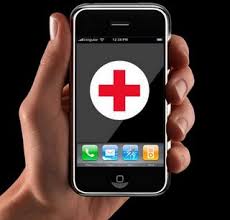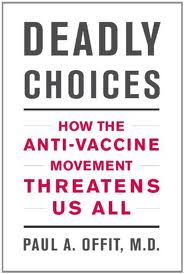February 27th, 2011 by Bryan Vartabedian, M.D. in Better Health Network, Opinion
No Comments »

 This is something. Jay Parkinson on the Future Well blog has suggested that health apps are overrated. Then on Twitter came a remark that the post represented “fightin’ words.” While I think the tweet was in jest, I’m sure there are some who will take offense to the less-than-flattering remarks about our coveted health apps.
This is something. Jay Parkinson on the Future Well blog has suggested that health apps are overrated. Then on Twitter came a remark that the post represented “fightin’ words.” While I think the tweet was in jest, I’m sure there are some who will take offense to the less-than-flattering remarks about our coveted health apps.
We love the concept of health apps for what they represent more than for what they really offer us. We want to feel that we’ve got it all in the palm of our hand. After all, technology might do for us what we won’t do for ourselves.
Like Jay I’m underwhelmed, but I don’t think that’ll always be the case. The post’s criticism should start a conversation about what’s real in mobile health and what isn’t. Even the fantasy of Health 2.0 has been questioned, and that’s a good thing. This dialog about reality versus rainbows and unicorns needs to continue.
Youngme Moon in Different: Escaping the Competitive Herd wrote, “The way to keep criticism from devolving into cynicism is to make it a starting point rather than a punctuation mark.” Jay Parkinson’s post is a starting point.
*This blog post was originally published at 33 Charts*
February 21st, 2011 by Bryan Vartabedian, M.D. in Opinion, Research
No Comments »

 More in the evolving meme of narrative medicine: Researchers at the University of Massachusetts Medical School (my alma mater) have found that for a select population of individuals, listening to personal narratives helps control blood pressure. While the power of stories is old news, the connection to clinical outcomes is what’s newsworthy here. Read Dr. Pauline Chen’s nice piece in the New York Times. The implications for ongoing work in this area are mind boggling.
More in the evolving meme of narrative medicine: Researchers at the University of Massachusetts Medical School (my alma mater) have found that for a select population of individuals, listening to personal narratives helps control blood pressure. While the power of stories is old news, the connection to clinical outcomes is what’s newsworthy here. Read Dr. Pauline Chen’s nice piece in the New York Times. The implications for ongoing work in this area are mind boggling.
The Annals of Internal Medicine study authors sum it up nicely:
Emerging evidence suggests that storytelling, or narrative communication, may offer a unique opportunity to promote evidence-based choices in a culturally appropriate context. Stories can help listeners make meaning of their lives, and listeners may be influenced if they actively engage in a story, identify themselves with the storyteller, and picture themselves taking part in the action.
This nascent field of narrative medicine caught my eye when I stumbled onto the work of Rita Charon and the concept of the parallel chart. Extrapolation to social media may be the next iteration of this kind of work.
*This blog post was originally published at 33 Charts*
February 13th, 2011 by Bryan Vartabedian, M.D. in Opinion, True Stories
No Comments »

 It was sometime in the mid-nineties that parents started showing up in my office with reams of paper. Inkjet printouts of independently unearthed information pulled from AltaVista and Excite. Google didn’t exist. In the earliest days of the Web, information was occasionally leveraged by families as a type of newfound control.
It was sometime in the mid-nineties that parents started showing up in my office with reams of paper. Inkjet printouts of independently unearthed information pulled from AltaVista and Excite. Google didn’t exist. In the earliest days of the Web, information was occasionally leveraged by families as a type of newfound control.
A young father and his inkjet printer
One case sticks clearly in my mind. It was that of a toddler with medically unresponsive acid reflux and chronic lung disease. After following the child for some time, the discussion with the family finally moved to the option of a fundoplication (anti-reflux surgery). On a follow-up visit the father had done his diligence and appeared in the office with a banker box brimming with printed information. He had done his homework and his volume of paper was a credible show of force.
At the time in Houston, the Nissen and Thal fundoplication were the accepted fundoplication procedures in children. Deep from the bottom of one of the boxes, the father produced a freshly-reported method of fundoplication from Germany. He had compared the potential complications with other types of fundoplication and this was the procedure he wanted.
What he didn’t understand was that an experimental technique used on a limited numbers of adults didn’t necessarily represent the best option for his toddler. I gave it everything I had but didn’t get very far. The tenor of his argument was slightly antagonistic. Ultimately there was nothing more I could do. I deferred the remainder of the discussion to one of our best “talking” surgeons, but knew the father wouldn’t get the time and consideration that I had offered.
I never saw the child again. As they say, the father voted with his feet. Read more »
*This blog post was originally published at 33 Charts*
February 7th, 2011 by Bryan Vartabedian, M.D. in Better Health Network, Opinion
1 Comment »

It’s happening more frequently: Requests for medical advice by email. The more I do, the more people I meet. The network grows and friends of friends learn about what I do.
So junior has a little pain and shows at the local ER where the requisite CT shows a little thickening of the ileum. Someone suggests that the family drop me a line. Here’s the problem: There’s more to this than digital correspondence will allow.
While the statistical reality of this child’s situation is that this finding represents a little edema from a virus, the differential is precarious: Crohn’s disease, lymphoma, tuberculous ileitis, eosinophilic enteropathy.
A case of this type requires the thorough exploration of a child’s story and a compulsive exam that takes into consideration the problems in the differential. Worrisome considerations need to be framed and discussed in the context of the child’s total presentation and real likelihood of occurrence. The sensitive dialog surrounding our diagnostic approach to this child requires a relationship. And the various approaches require an element of negotiation with the family. All of this takes time, emotional intelligence, and good clinical judgment.
Children are complicated creatures. Parents are more complicated. Loose, off-the-cuff advice based on shotty information shortchanges both parties.
Of course the easiest response to these regular queries is that my employer, malpractice carrier, and the Texas State Board preclude offering medical advice without an established relationship or the maintenance of a medical record available for peer review. Everybody understands legalese. Few, however, understand the complexity of a properly executed medical encounter.
*This blog post was originally published at 33 Charts*
January 31st, 2011 by Bryan Vartabedian, M.D. in Book Reviews, Opinion
No Comments »

 A friend suggested she was tired of hearing about vaccines. Her comment and our subsequent conversation seemed to reflect an important shift in parent sentiment: The conversation about vaccines is beginning to get somewhere.
A friend suggested she was tired of hearing about vaccines. Her comment and our subsequent conversation seemed to reflect an important shift in parent sentiment: The conversation about vaccines is beginning to get somewhere.
While much of this was born of the mainstream media’s newfound realization that the vaccine-autism connection was cooked, some of this is due to the tireless work of those like the Children’s Hospital of Philedelphia’s Dr. Paul Offit who get the story right.
As part of his passionate agenda to expose vaccine truths, he’s published “Deadly Choices: How the Anti-vaccine Movement Threatens Us All” (Basic Books, 2011). For those looking to understand the origins of anti-vaccine sentiment, read this book.
What struck me is the deep history behind the anti-vaccine movement. From Jenner’s smallpox fix to modern-day MMR struggles, Offit draws fascinating corollaries surrounding immunization that seem to defy the generations. Vaccine resistance was not born of Andrew Wakefield, but broader concerns rooted in religion, individual liberty, fear and propaganda. “Deadly Choices” puts the anti-vaccine movement in a historic sequence that reads like good suspense. I couldn’t put it down. Read more »
*This blog post was originally published at 33 Charts*
This is something. Jay Parkinson on the Future Well blog has suggested that health apps are overrated. Then on Twitter came a remark that the post represented “fightin’ words.” While I think the tweet was in jest, I’m sure there are some who will take offense to the less-than-flattering remarks about our coveted health apps.



 More in the evolving meme of narrative medicine: Researchers at the University of Massachusetts Medical School (my alma mater)
More in the evolving meme of narrative medicine: Researchers at the University of Massachusetts Medical School (my alma mater) 









